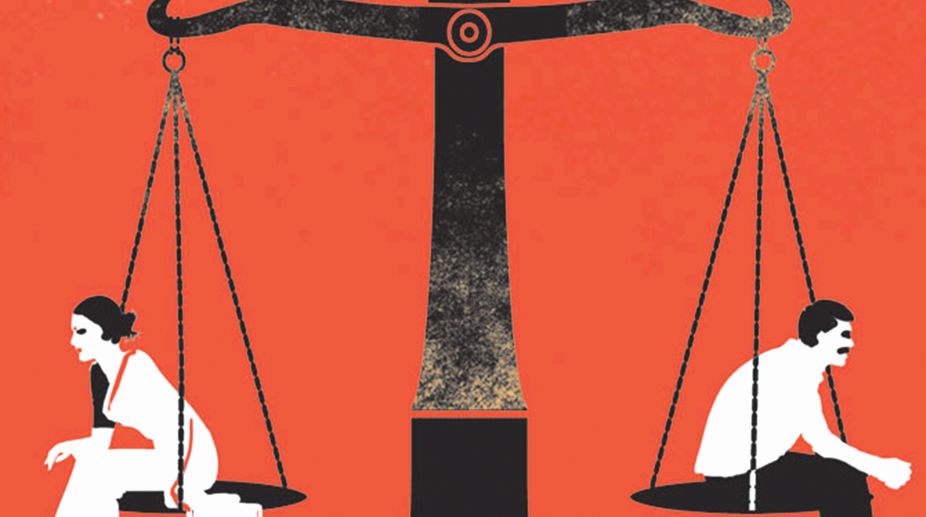The Indian law on adultery is out of sync with the times, has an inherent gender-bias and treats the wife as the personal property of the husband. Several times in the past the law had been challenged on various grounds but each time the courts had upheld its Constitutional validity. But now the Supreme Court has decided to entertain a petition that challenges various Sections of the Indian Penal Code (IPC) and the Code of Criminal Procedure (CrPC) that deal with the subject on grounds of being biased and discriminatory.
While admitting the petition and seeking the Centre’s reply in four weeks, the court asked “How can a law patronise women by saying women are always victims in a case of adultery? Isn’t such a law discriminatory and implies gender bias? By saying that the offence is not committed if the woman’s husband gives his consent, isn’t the law reducing a woman into a commodity?”
It went on to add that “the provision (Section 497) really creates a dent in the individual independent identity of a woman when the emphasis is laid on the connivance or consent of the husband. This tantamounts to subordination of a woman where the Constitution confers (women) equal status.”
But that is only one part of the problem. The Supreme Court would be doing a great disservice to law and justice if it examines the law from only the narrow point of gender-bias. For, Section 497 as existing today has a very narrow and convoluted definition of adultery. Since this section was introduced by the British (who have since then moved on in their own country and have decriminalised adultery) based on Victorian values, it looks at adultery from only one angle. Section 497 reads as “whoever has sexual intercourse with a person who is and whom he knows or has reason to believe to be the wife of another man, without the consent or connivance of that man, such sexual intercourse not amounting to the offence of rape, is guilty of the offence of adultery, and shall be punished with imprisonment of either description for a term which may extend to five years, or with fine, or with both. In such case, the wife shall not be punishable as an abettor.”
Even a simple reading of the Section by even a layman will show that there are several flaws. Firstly, it defines adultery as the act of having sexual relations between a man and a married woman. This effectively blanks out the other form of adultery where a married man has sexual relations with an unmarried woman. Also, with changing mores, what happens when either of the spouses enters into a same-sex relationship?
Secondly, it chooses to validate the act if it is done with consent or connivance of the husband, thereby treated women as his personal property, to be used as desired. Lastly, it clearly mentions that “the wife shall not be punishable as an abettor.” This is highly discriminatory as it seeks to provide legal immunity to a person who is an equal partner in an act that is considered a crime.
Further, when it comes to lodging a case against adultery, the bias is even more pronounced. Section 198 of the CrPC which deals with prosecution for offences against marriage mandates that when a crime is committed under Section 497 of the IPC, only the husband can lodge a police complaint. Sub-Section 2 of the above Section says that “no person other than the husband of the woman shall be deemed to be aggrieved by any offence punishable under Section 497 or Section 498 of the said Code.” This means that if the husband is in a sexual relationship with a woman, the wife has no remedy and cannot proceed against him for adultery. Only the husband of his paramour can do so, if the paramour is married. The situation is even more alarming in case the husband is in an illicit relationship with an unmarried woman. Why this discrimination and why can the wife not proceed against the husband for the same crime? Why does the law feel that only a husband can be aggrieved and why does India still has this outdated law on the statute books?
The Supreme Court can choose to be a stickler for rules and refuse to look into the matter from the wider perspective. It can say that since the petition has only questioned the gender-bias, it will look into that only. But that will amount to an injustice. First of all, the court has to decide whether adultery is criminal or not. Since marriage is a civil contract between two parties, any deviance from that contract should also have remedy under civilian laws. Adultery may be unacceptable socially, morally or on religious grounds, but keeping it criminal is no longer valid. Worldwide, adultery has been decriminalised in a majority of countries. The court should ideally decriminalise adultery.
If the court decides to keep adultery under criminal laws then it would have to redefine it. Section 497 (and 498) of the IPC would need to be rid of their gender-bias. A suitable rewording of the Section would suffice. Section 497 could be reworded thus: “if any married person has sexual intercourse with any person other than his or her spouse, such sexual intercourse not amounting to the offence of rape, is guilty of the offence of adultery, and shall be punished with imprisonment of either description for a term which may extend to five years, or with fine, or with both.” To make matters clear, an explanation is necessary to say “for the purpose of Section 198 of the CrPC, the spouse of the person committing the offence can be the aggrieved party.” This would make sub-Section 2 of Section 198 meaningless and it should be deleted.
Such a correction, while making the law of gender-neutral, would also allow the wife to lodge a complaint against her husband’s infidelity, a remedy she does not have now. This will rid the law of a major discrimination.
This correction is very necessary as other laws recognise adultery by its wider meaning as opposed to the narrow meaning assigned to it under Section 497 of the IPC. Under Section 13(1)(i) of the Hindu Marriage Act, 1955, for instance, a divorce can be asked for by either of the spouses on the ground of infidelity by one. The Section reads “1) Any marriage solemnised, whether before or after the commencement of this Act, may, on a petition presented by either the husband or the wife, be dissolved by a decree of divorce on the ground that the other party; (i) has, after the solemnisation of the marriage, had voluntary sexual intercourse with any person other than his or her spouse.” Since this Section is gender neutral and does not discriminate between who can file the claim, it is fair. The law on adultery must also be similarly free of discrimination.
The writer is Editor-in-Chief, www.indiacommentary.com












